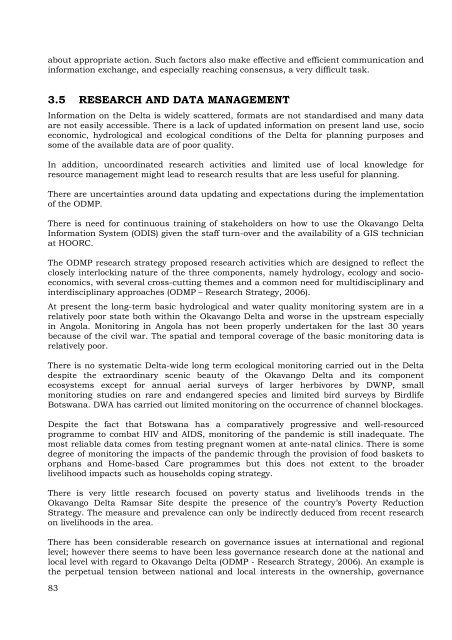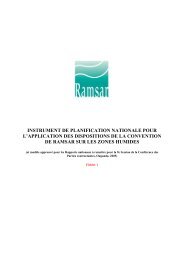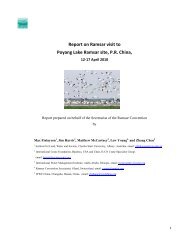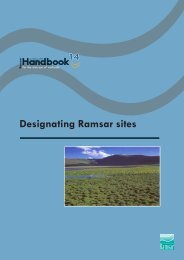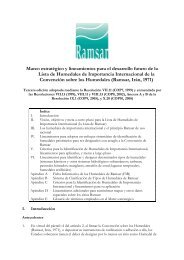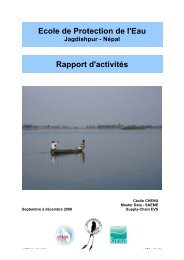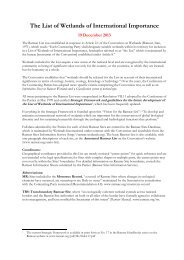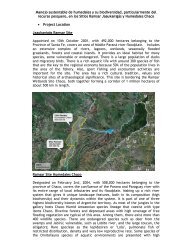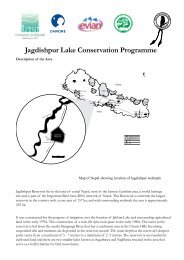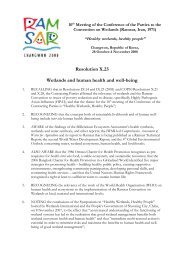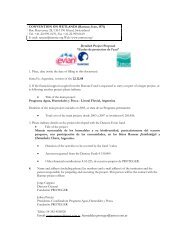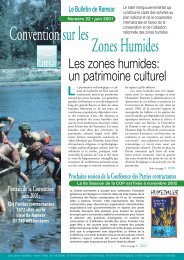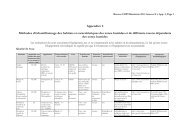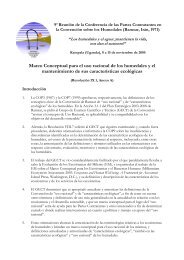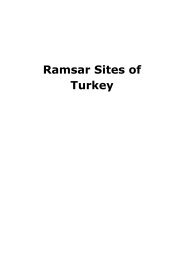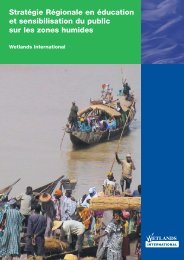Okavango Delta Management Plan - Ramsar Convention on Wetlands
Okavango Delta Management Plan - Ramsar Convention on Wetlands
Okavango Delta Management Plan - Ramsar Convention on Wetlands
Create successful ePaper yourself
Turn your PDF publications into a flip-book with our unique Google optimized e-Paper software.
about appropriate acti<strong>on</strong>. Such factors also make effective and efficient communicati<strong>on</strong> and<br />
informati<strong>on</strong> exchange, and especially reaching c<strong>on</strong>sensus, a very difficult task.<br />
3.5 RESEARCH AND DATA MANAGEMENT<br />
Informati<strong>on</strong> <strong>on</strong> the <str<strong>on</strong>g>Delta</str<strong>on</strong>g> is widely scattered, formats are not standardised and many data<br />
are not easily accessible. There is a lack of updated informati<strong>on</strong> <strong>on</strong> present land use, socio<br />
ec<strong>on</strong>omic, hydrological and ecological c<strong>on</strong>diti<strong>on</strong>s of the <str<strong>on</strong>g>Delta</str<strong>on</strong>g> for planning purposes and<br />
some of the available data are of poor quality.<br />
In additi<strong>on</strong>, uncoordinated research activities and limited use of local knowledge for<br />
resource management might lead to research results that are less useful for planning.<br />
There are uncertainties around data updating and expectati<strong>on</strong>s during the implementati<strong>on</strong><br />
of the ODMP.<br />
There is need for c<strong>on</strong>tinuous training of stakeholders <strong>on</strong> how to use the <str<strong>on</strong>g>Okavango</str<strong>on</strong>g> <str<strong>on</strong>g>Delta</str<strong>on</strong>g><br />
Informati<strong>on</strong> System (ODIS) given the staff turn-over and the availability of a GIS technician<br />
at HOORC.<br />
The ODMP research strategy proposed research activities which are designed to reflect the<br />
closely interlocking nature of the three comp<strong>on</strong>ents, namely hydrology, ecology and socioec<strong>on</strong>omics,<br />
with several cross-cutting themes and a comm<strong>on</strong> need for multidisciplinary and<br />
interdisciplinary approaches (ODMP – Research Strategy, 2006).<br />
At present the l<strong>on</strong>g-term basic hydrological and water quality m<strong>on</strong>itoring system are in a<br />
relatively poor state both within the <str<strong>on</strong>g>Okavango</str<strong>on</strong>g> <str<strong>on</strong>g>Delta</str<strong>on</strong>g> and worse in the upstream especially<br />
in Angola. M<strong>on</strong>itoring in Angola has not been properly undertaken for the last 30 years<br />
because of the civil war. The spatial and temporal coverage of the basic m<strong>on</strong>itoring data is<br />
relatively poor.<br />
There is no systematic <str<strong>on</strong>g>Delta</str<strong>on</strong>g>-wide l<strong>on</strong>g term ecological m<strong>on</strong>itoring carried out in the <str<strong>on</strong>g>Delta</str<strong>on</strong>g><br />
despite the extraordinary scenic beauty of the <str<strong>on</strong>g>Okavango</str<strong>on</strong>g> <str<strong>on</strong>g>Delta</str<strong>on</strong>g> and its comp<strong>on</strong>ent<br />
ecosystems except for annual aerial surveys of larger herbivores by DWNP, small<br />
m<strong>on</strong>itoring studies <strong>on</strong> rare and endangered species and limited bird surveys by Birdlife<br />
Botswana. DWA has carried out limited m<strong>on</strong>itoring <strong>on</strong> the occurrence of channel blockages.<br />
Despite the fact that Botswana has a comparatively progressive and well-resourced<br />
programme to combat HIV and AIDS, m<strong>on</strong>itoring of the pandemic is still inadequate. The<br />
most reliable data comes from testing pregnant women at ante-natal clinics. There is some<br />
degree of m<strong>on</strong>itoring the impacts of the pandemic through the provisi<strong>on</strong> of food baskets to<br />
orphans and Home-based Care programmes but this does not extent to the broader<br />
livelihood impacts such as households coping strategy.<br />
There is very little research focused <strong>on</strong> poverty status and livelihoods trends in the<br />
<str<strong>on</strong>g>Okavango</str<strong>on</strong>g> <str<strong>on</strong>g>Delta</str<strong>on</strong>g> <str<strong>on</strong>g>Ramsar</str<strong>on</strong>g> Site despite the presence of the country’s Poverty Reducti<strong>on</strong><br />
Strategy. The measure and prevalence can <strong>on</strong>ly be indirectly deduced from recent research<br />
<strong>on</strong> livelihoods in the area.<br />
There has been c<strong>on</strong>siderable research <strong>on</strong> governance issues at internati<strong>on</strong>al and regi<strong>on</strong>al<br />
level; however there seems to have been less governance research d<strong>on</strong>e at the nati<strong>on</strong>al and<br />
local level with regard to <str<strong>on</strong>g>Okavango</str<strong>on</strong>g> <str<strong>on</strong>g>Delta</str<strong>on</strong>g> (ODMP - Research Strategy, 2006). An example is<br />
the perpetual tensi<strong>on</strong> between nati<strong>on</strong>al and local interests in the ownership, governance<br />
83


